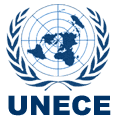UNECE with UN/CEFACT
The UN Economic Commission for Europe (UNECE),one of the five Regional Commissions of the UN, has been at the forefront of Trade Facilitation developments for over 50 years, with many of its Recommendations, Standards and support tools being implemented world-wide. For example, the UNECE LAYOUT KEY (UNLK) for trade documents is the cornerstone for trade document standardization globally and is a foundation for the development of electronic trade documents using the UN Trade Data Element Directory (UN/TDED). Further, UNECE’s UN/EDIFACT is the main Electronic Data Interchange (EDI) standard adopted throughout the world and used extensively in National Customs and International Shipping, amongst others.
UNECE has continued this tradition with the development of over 30 Trade Facilitation Recommendations and a wide range of supporting standards for electronic business, the latest being the suit of Recommendations on Single Window, including the benchmark Recommendation 33 on Establishing a Single Window and the complementary Recommendations 34 and 35 on Data Harmonization and the Legal Framework for Single Window respectively. All UNECE Trade Facilitation Recommendations, Standards and tools are available for free on our website at http://www.unece.org/cefact.html
UNECE undertakes its work in trade facilitation through its UN Centre for Trade Facilitation and Electronic Business (UN/CEFACT). UN/CEFACT has a global mandate for developing UN Trade Facilitation Recommendations and Standards. It is open to participation from all UN member States. It is a subsidiary, intergovernmental body of the UNECE Committee of Trade and is managed by a Bureau comprising a Chair and several Vice-chairs. Currently, these officers are from India, Italy, the Netherlands, Nigeria, Sweden and the United States. Individual UN/CEFACT members are experts from intergovernmental organizations, individual countries’ authorities and also from the business community.
UN/CEFACT develops and publishes:
- technical standards, i.e. specifications that establish how one or more business standards and/or recommendations will be developed;
- business standards, i.e. specifications that provide rules, guidelines and/or principles related to activities in the context of trade facilitation or electronic business;
- UNECE Recommendations on trade facilitation that provide formal guidance to governments, the private sector and the business community.
The objective of UNECE’s work in the field of trade facilitation and electronic business is to enhance national competitiveness and participation in global markets by helping countries develop the knowledge and institutions for facilitating national and international transactions. This is achieved through the simplification and harmonization of processes, procedures and information flows.
To support this objective, UNECE, in addition to its standards development work, undertakes activities to:
- support and build capacity in national trade facilitation institutions through advisory services and workshops;
- support the establishment and operation of national Single Windows for export and import procedures and information;
- analyse and simplify business processes to remove bottlenecks and enhance trade efficiency;
- support the implementation of electronic alternatives to key paper documents in the international supply chain; and
- support paperless trade transactions.
UNECE is also a co-founder of the United Nations Network of Experts for Paperless Trade in Asia and the Pacific (UNNExT).

